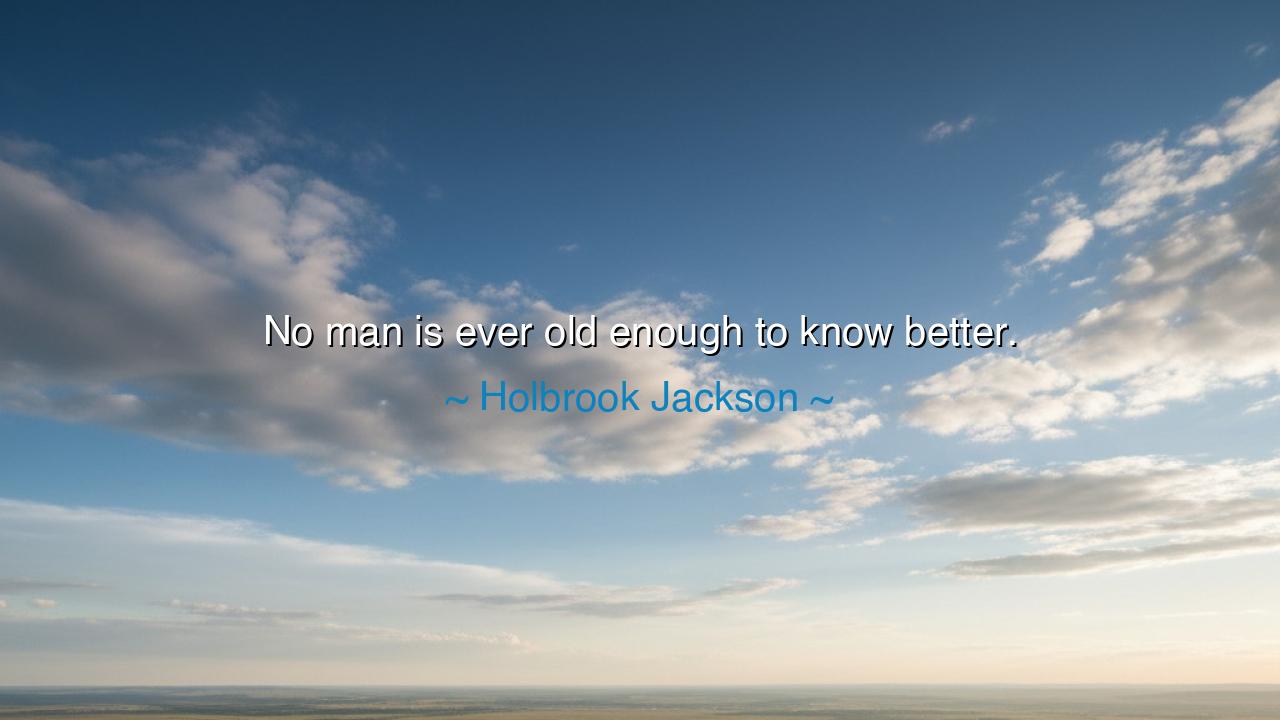
No man is ever old enough to know better.






"No man is ever old enough to know better." - Holbrook Jackson. These words echo a profound truth about the human spirit, a truth that transcends time and place. Jackson's statement challenges the assumption that age brings complete wisdom or mastery over life’s choices. Rather, he suggests that even in our later years, we are never truly immune from the mistakes, passions, and impulses that mark our human nature. No matter how much time passes, the essence of being human—our desire, our emotions, and our flaws—remains, and even the oldest among us will still find ourselves navigating the same, ancient currents of impulsiveness and regret.
Consider the life of Winston Churchill, who, despite his towering accomplishments, made choices that were not always based on the greatest wisdom. Churchill, known for his leadership during World War II, also found himself making controversial decisions that cost lives and altered history in ways that were difficult to reverse. Even in his later years, when his body had aged and his wisdom was well-earned, he made choices that could be seen as lacking foresight or prudence. Churchill's life shows that no matter how much we achieve, we are never free from the same human errors—our passions and decisions are always a blend of reason and impulse, even in the twilight of our years.
This paradox—being both wise and flawed—is at the heart of Jackson's quote. He reminds us that no one is ever completely free of mistakes, no matter their age. Wisdom, often thought to come with time, is not a guarantee that we will always choose wisely or avoid error. The elderly, like the young, are subject to the whims of their heart, ego, and circumstances. Their experience may offer insight, but it does not promise perfection. Even as the years accumulate, the capacity for error remains within us. It is a constant, a companion to every stage of life. Age and experience may soften the blows, but they do not prevent us from stumbling along the way.
Take the example of Albert Einstein, whose mind was perhaps the sharpest of his time, yet even he was not immune to misjudgments. While his theories reshaped the course of physics, some of his political views were later criticized, and he made decisions in his personal life that caused pain and conflict. Despite his towering intellect and vast wisdom, Einstein was not impervious to the same mistakes that lesser men make. He, too, was subject to the eternal human condition that Jackson speaks of—no man, no matter how wise, is immune to error. Einstein’s life is a reminder that wisdom does not grant us an impenetrable shield from making mistakes.
Jackson’s statement also carries a deeper philosophical truth: that it is not the avoidance of error that defines us, but our ability to learn from it. To be human is to continually fall, and then rise again, with the knowledge that no matter how many times we gain insight, we will still face challenges that test our understanding. Wisdom, as Jackson suggests, is not the absence of mistakes but the capacity to continue growing, even in the face of them. The key is not in being immune to failure but in embracing the process of learning and adaptation as we journey through life.
The lesson here is not one of despair but of humility. We must recognize that no matter how old we become, we are never immune to the same impulses and passions that drive us in our youth. The essence of being human is that we never fully “know better.” Each decision is a new opportunity for growth, for understanding, and yes, for failure. And yet, this should not be a source of shame or frustration but an invitation to embrace the imperfection that makes us human. It is through our mistakes that we are given the chance to learn, to adapt, and to grow in wisdom.
Thus, the practical advice to take from Jackson’s words is this: accept your mistakes, no matter your age. Learn from them, but do not be bound by them. Recognize that the path to wisdom is not a straight line, but a tangled web of trial and error. Let humility guide you, and let grace be the balm for the inevitable imperfections you will encounter. Embrace your humanity with all its contradictions, for in doing so, you will unlock the true meaning of growth—not in the avoidance of mistakes, but in the courage to keep moving forward, wiser and more open than before.






AAdministratorAdministrator
Welcome, honored guests. Please leave a comment, we will respond soon